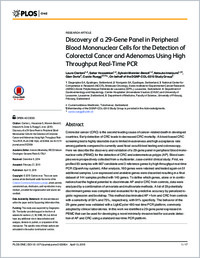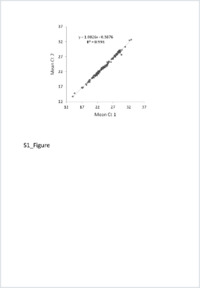Discovery of a 29-gene panel in peripheral blood mononuclear cells for the detection of colorectal cancer and adenomas using high throughput real-time PCR
- Ciarloni, Laura Diagnoplex SA, Epalinges, Switzerland - Novigenix SA, Epalinges, Switzerland
- Hosseinian, Sahar Diagnoplex SA, Epalinges, Switzerland - Novigenix SA, Epalinges, Switzerland
- Monnier-Benoit, Sylvain Diagnoplex SA, Epalinges, Switzerland - Novigenix SA, Epalinges, Switzerland
- Imaizumi, Natsuko Diagnoplex SA, Epalinges, Switzerland - National Center for Competence in Research (NCCR), Molecular Oncology, Swiss Institute for Experimental Cancer Research (ISREC)-Ecole Polytechnique Fédérale de Lausanne (EPFL), Switzerland
- Dorta, Gian Department of Gastroenterology and Hepatology, Centre Hospitalier Universitaire Vaudois (CHUV) and University of Lausanne, Switzerland
- Rüegg, Curzio Novigenix SA, Epalinges, Switzerland - National Center for Competence in Research (NCCR), Molecular Oncology, Swiss Institute for Experimental Cancer Research (ISREC)-Ecole Polytechnique Fédérale de Lausanne (EPFL), Switzerland - Department of Medicine, Faculty of Science, University of Fribourg, Switzerland
-
13.04.2015
Published in:
- PLoS ONE. - 2015, vol. 10, no. 4, p. e0123904
English
Colorectal cancer (CRC) is the second leading cause of cancer-related death in developed countries. Early detection of CRC leads to decreased CRC mortality. A blood-based CRC screening test is highly desirable due to limited invasiveness and high acceptance rate among patients compared to currently used fecal occult blood testing and colonoscopy. Here we describe the discovery and validation of a 29-gene panel in peripheral blood mononuclear cells (PBMC) for the detection of CRC and adenomatous polyps (AP). Blood samples were prospectively collected from a multicenter, case-control clinical study. First, we profiled 93 samples with 667 candidate and 3 reference genes by high throughput real-time PCR (OpenArray system). After analysis, 160 genes were retained and tested again on 51 additional samples. Low expressed and unstable genes were discarded resulting in a final dataset of 144 samples profiled with 140 genes. To define which genes, alone or in combinations had the highest potential to discriminate AP and/or CRC from controls, data were analyzed by a combination of univariate and multivariate methods. A list of 29 potentially discriminant genes was compiled and evaluated for its predictive accuracy by penalized logistic regression and bootstrap. This method discriminated AP >1cm and CRC from controls with a sensitivity of 59% and 75%, respectively, with 91% specificity. The behavior of the 29-gene panel was validated with a LightCycler 480 real-time PCR platform, commonly adopted by clinical laboratories. In this work we identified a 29-gene panel expressed in PBMC that can be used for developing a novel minimally-invasive test for accurate detection of AP and CRC using a standard real-time PCR platform.
- Faculty
- Faculté des sciences et de médecine
- Department
- Médecine 3ème année
- Language
-
- English
- Classification
- Biological sciences
- License
-
License undefined
- Identifiers
-
- RERO DOC 255903
- DOI 10.1371/journal.pone.0123904
- Persistent URL
- https://folia.unifr.ch/unifr/documents/304192
Other files
Statistics
Document views: 120
File downloads:
- pdf: 184
- Supplementary material: 135

